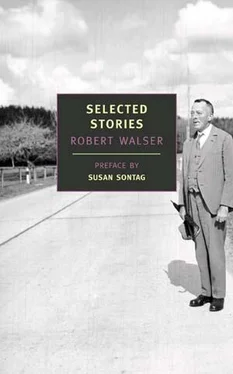Even this tablecloth has its own peculiar soul, so he wished to imagine, and every related wish came true, at once. Pale, white, enigmatically pure it lay there: he walked up to it, rumpled it. Amazing how it let itself be grasped, exactly as the person touching it had desired. It may be that he spoke to it: “Come to life!” Meanwhile, one should not forget that he had the necessary time to undertake strange experiments, exercises, playful tests, investigations. He was fortunate to have a wife to whom he could entrust, without any anxiety, everyday cares, housekeeping, etc. He seems to have treated her as a large and beautiful flower that never opened its cup, her lips, to utter the least complaint. Oh, this flower, it kept to itself everything about him that displeased her, she was, I tell myself, a miracle of docility, her tolerance of her husband’s quirks and circumspections was the tolerance of an angel. The latter were for her a magic palace, which she left alone, approved of, into which she never penetrated with the least innuendo, of which she thought little, though she also respected it. She could tell herself: These matters are no concern of mine. Doubtless because she never did impinge upon her companion’s mere “schoolboy difficulties,” which is how his efforts often appeared to her, she had humanity, or shall we say tact. For hours and days on end he sought out ways to make unintelligible the obvious, and to find for things easily understood an inexplicable basis. As time went by, a secret watchfulness settled in his eyes from so much precise circling of contours that became for him edges of a mystery. An entire quiet lifetime he spent fighting inaudibly and, one might be tempted to say, with nobility, to make mountainous — if such a paraphrase might suffice — the frame of things.
My gist is that a region, for instance, becomes bigger and richer in a surround of mountains.
Apparently his wife did often try to persuade him that he should relinquish the gallings of this almost ridiculous struggle, that he should travel somewhere, not be so deeply absorbed all the time in such a singular and monotonous task.
He replied: “All right! Might I ask you to do the necessary packing?”
She did so, yet he didn’t travel, but stayed where he was, that is to say, he traveled and raveled again in circles around the limits of the bodies he portrayed, the bodies he reconstructed, and from the bag or basket she removed again, just as gently, and somewhat thoughtfully, everything she had packed with the utmost care into them, and the same old life went on as before, the old life that this dreamer renewed for himself again and again.
One might keep an eye on the peculiarity that he looked upon his wife as if she were a fruit on the tablecloth. For him the outlines, the contours of his wife were exactly the same simple but also complicated ones as he’ll have seen around flowers, glasses, dishes, knives, forks, tablecloths, fruits, and coffeepots and cups. A pat of butter was for him just as significant as a delicate pleat corrugating his wife’s dress. I recognize that my wording here is inadequate, but I would like to think that I can be understood nevertheless, or perhaps better and more deeply, on account of such provisional phrasing, in which the lights have a shimmering effect, although I deplore in principle, of course, any sort of hastiness. He persisted in being that kind of studio person who is always open to attack from the standpoint of family or nation. One can hardly refrain from believing that he was Asiatic. Is not Asia the motherland of art, of spirituality, these utter luxuries? To think of him as a person who never liked to eat would probably be mistaken. He ate fruits and studied them with equal pleasure; he enjoyed the taste of ham just as much as its form and color, which he called “wonderful,” and its presence, which he called “phenomenal.” If he drank wine, its pleasant taste astonished him — though one should not speak exaggeratedly of this characteristic. For he translated wine, too, into the domain of art. He magicked flowers onto paper, so that upon it they quivered, rejoiced, and smiled, swaying in their plantlike ways; his concern was the flesh of flowers, the spirit of the secret which dwells in the resistance a thing with special properties offers to understanding.
All the things he grasped became intermarried, and if we find it proper to speak of his musicality, it was from the plenitude of his observation that it sprang, and from his asking each object if it might agree to give him a revelation of its essence, and most preeminently from his placing in the same “temple” things both large and small.
The things he contemplated became eloquent, and the things to which he gave shape looked back at him as if they had been pleased, and that is how they look at us still.
One could justly insist that he made the most extensive use, bordering on the inexhaustible, of the suppleness and the compliance of his hands.
[1929]
Postscript by Christopher Middleton
Postscript
ROBERT WALSER (1878–1956) wrote four novels during his thirty years as a writer. Three were published during the first decade of this century (1906, 1907, 1908) and attracted some remarkable minds, notably Morgenstern and Kafka, but they hardly appealed to a broad public. The fourth novel was lost in the early 1920s. Eventually, the manuscript surfaced in West Berlin and was published as Der Räuber-Roman in 1976. It is in the field of short prose that Walser excelled. There is some justice to his claim to be writing, in separate swirls of short prose, a “long, plotless, realistic story,” but his clownish and distinctly Swiss genius was at its best in miniature fictions with a rapid pulse — those sketches, soliloquies, improvisations, arabesques, and capriccios that form his ten collections (1904–25) and the four volumes of uncollected work now available in the Gesamtwerk.
Walser was largely self-educated, always poor, and just as dedicated to his mischievously secret and independent life as Rilke was to his forbidding “work.” Among the various types of short prose in the German tradition, going back to the medieval Latin Gesta Romanorum, there are certain strains which, like the ballad and the folk song, escape those distinctions that have historically tended to reserve certain other genres for readers of the upper or middle classes (e.g., the novel). Small wonder that Walser, with his proletarian mode of life and his princely imagination, found in short prose his proper habitat.
As for the tradition, one thinks of the anecdotes that pepper Abraham a Sancta Clara’s sermons of the seventeenth century; of philosophical aperçus from Lichtenberg to Nietzsche and Wittgenstein; of Johann Peter Hebel’s tales and reports of the early 1800s; of the Expressionist “grotesques” of Salomo Friedländer (preceded by the fantasies of Josef Popper-Lynkeus); and, by no means least, of the nineteenth- and early twentieth-century masters of feuilleton, the miniature impressions, gossipings, entertainments, anecdotes, parables, often with a lyrical twist, which since the 1820s — following French models — had been appearing under the main news items on the front page of newspapers. All this was the humus out of which eventually Walser’s short prose came; out of the same humus came, too, Kafka’s Yggdrasill of parables.
Walser eked out a living as a feuilletonist, contributing also to periodicals, in Berlin (1905–13), in Biel (1913–20), and in Berne (1921–32). Yet his prose surpasses, in coloration and sensibility, the usual sketch or impression of the time. What I have tried to do in this selection is present some of the main lines, or radiations, of his power of invention in the miniature, of his charm in the grotesque, also of his ironic reflexivity, viz., his jazzy oscillations between levels of discourse — dense and transparent, straight and mocking. Conceivably, he was one of the earliest and foremost artists in German prose to make positive fun of his understanding that the truth of writing can deregulate or negate reference, while seeming to uphold it. Well before the 1920s, the text for Walser is a non-thing, as much so as a Cubist guitar or Magritte’s apple ( “Ceci n’est pas une pomme” ).
Читать дальше












